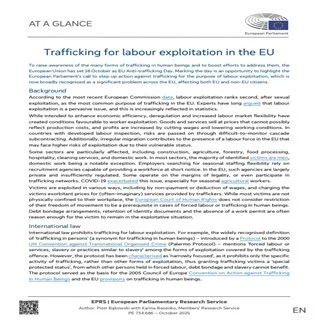By Ilias Chatzis, et al.
Illicit $nancial %ows (IFFs) – $nancial %ows that are illicit in origin, transfer, or use, that re%ect an exchange of value and cross country borders – are major impediments to sustainable development. !ey divert important resources away from state revenue and public investments, foster impunity, and ultimately erode criminal justice systems as a whole. !e harmful e&ects of illicit $nancial %ows and the need to reduce them are demonstrated by their inclusion in the 2030 Agenda for Sustainable Development as Target 16.4. It stipulates the goal to “signi$cantly reduce illicit $nancial %ows and arms %ows, strengthen the recovery and return of stolen assets and combat all forms of organized crime”. Progress towards this target is measured by SDG Indicator 16.4.1 (the “total value of inward and outward IFFs in current US dollars”), for which UNODC is the custodian together with UNCTAD. Organized crimes vary in their characteristics, objectives, and the extent to which they cross national borders. Consequently, the amount and nature of the IFFs they generate also varies. Given the transnational nature of smuggling of migrants (SOM) and cross-border tra"cking in persons (TIP), monitoring and combatting IFFs is crucially important for disrupting, prosecuting, and dismantling the organized criminal networks committing these dangerous crimes. !is Study focuses on the trends, nuances, and complexities surrounding IFFs associated with smuggling of migrants and tra"cking in persons into the European Union (EU), with speci$c attention paid to those relating to GLO.ACT partner countries.1 It is based on an analysis of available data, $eld research $ndings, and review of secondary literature. Smuggling of migrants For smuggling of migrants, the $ndings of this Study con$rm that the GLO.ACT partner countries are signi$cant countries of origin of smuggled people into Europe. According to Frontex, there were a total of 184,323 attempts at irregular entry into the EU by people from the four GLO.ACT partner countries during the $ve years between January 2018 and December 2022.2 According to Europol and Interpol, more than 90 per cent of irregular entries into the EU are facilitated by smugglers.3 !us, based on the detection of irregular entry attempts, it can be estimated that nearly 166,000 were smuggling incidents. As both the payment for and the cost of facilitating such smuggling generate IFFs, it follows that smuggling of migrants relating to GLO.ACT partner countries generates considerable IFFs. !e Study has also found that, from 2018 to 2021, the Eastern Mediterranean Sea route had been the route most commonly used by people from GLO.ACT partner countries to irregularly enter the EU.4 However, the trend changed in 2022 when the Western Balkans land route became the most popular for people from GLO.ACT partner countries. !is is apparent from the interceptions during 2022: there were 31,980 total detections for the Western Balkans land route followed by the Central Mediterranean Route with 15,062 total detections.5 !e Western Balkans route involves refugees and migrants leaving Türkiye, traveling through Greece or Bulgaria, exiting the EU, and traveling through North Macedonia, Serbia, Bosnia and Herzegovina, and/or Albania before re-entering the EU via Hungary, Croatia, or Romania. !e Central Mediterranean Route is dominated by Libyan smuggling networks, who charge an average of US$1,500 - $1,800 per client to smuggle them from Libya to Italy by boat.6 In 2017, the peak year for arrivals on this route, organized criminal groups running smuggling operations along this route were estimated to have earned a gross income of $150 million. However, this income decreased to just over €24 million in 2018, and to €12 million in 2019.7 Trafcking in persons For tra"cking in persons, the type of tra"cking actors, forms of exploitation and victim pro$les heavily in%uence the size, modalities, and directions of IFFs. !e most pro$t tends to be made in the exploitation phase, as the %ow of revenue is continuous rather than one-o&. Tra"cking for forced labour and sexual exploitation are the most common forms of exploitation and provide for repeated pro$ts from continued exploitation. For IFFs associated with tra"cking in persons, an important distinction can be made between domestic tra"cking and cross-border tra"cking. Domestic tra"cking is less likely to generate IFFs – which are cross-border in nature – unless the perpetrator, the victim or other actors involved have their centre of economic interest outside the country. !e UNODC Global Report on Tra"cking in Persons 2022 indicates that an overwhelming majority (99 per cent) of detected victims of tra"cking in South Asia8 are domestically tra"cked. However, the data also indicates an increase in the number of detected South Asian victims identi$ed in other regions of the world. In fact, the tra"cking victims from GLO.ACT partner countries are among the most commonly detected nationalities from outside the region in Western and Southern Europe, particularly in the United Kingdom, Türkiye and Italy.9 It can thus be assumed that IFFs associated with cross-border tra"cking in persons from the GLO.ACT partner countries have been increasing in the recent years. Furthermore, as UNODC Global Reports on Tra"cking in Persons records only the administrative data on cases identi$ed by the authorities in the respective countries, it is likely that a signi$cant proportion of tra"cking cases and attendant IFFs go undetected. In the case of smuggling of migrants and tra"cking in persons from GLO.ACT partner countries, IFFs are generated through cash payments, value transfers using the hawala system, and to a lesser extent, money transfer service providers. !is poses challenges in responding to IFFs related to smuggling and tra"cking, as the majority of cases involve payment and transfer methods that are not easily traceable. !e illicit income made by smugglers and tra"ckers are largely spent in three ways: (a) sent back to the country of origin, often invested in legal businesses such as restaurants, bars, or real estate; (b) used to support a lavish lifestyle, generating IFFs related to consumer goods; and (c) invested in other criminal or legitimate activities in the destination country. All such uses may generate IFFs. Not only do the crimes of migrant smuggling and tra"cking in persons seriously endanger the lives, safety and well-being of the individuals being smuggled or tra"cked, but they also generate signi$cant sums of illicit $nancial %ows. !is ultimately undermines state institutions, promotes impunity, and further bolsters the means of criminals involved. An enhanced understanding and investigation of illicit $nancial %ows is a crucial step towards more e&ective disruption, prosecution and dismantling of migrant smuggling and tra"cking networks.
Vienna: United Nations Office on Drugs and Crime - UNODC, 2023. 86p.





















